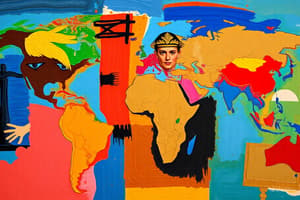Podcast
Questions and Answers
What was one of the main motivations for European exploration and colonization in the 15th century?
What was one of the main motivations for European exploration and colonization in the 15th century?
- Promotion of cultural diversity
- Desire to spread democracy
- Need for territorial expansion
- Quest for resources (correct)
Which event marked the beginning of European colonization in the Americas?
Which event marked the beginning of European colonization in the Americas?
- Christopher Columbus's arrival in 1492 (correct)
- French Revolution
- Spanish Inquisition
- Napoleonic Wars
Besides Europeans, which other groups engaged in colonization across Asia and Africa?
Besides Europeans, which other groups engaged in colonization across Asia and Africa?
- Africans and Australians
- Russians and Japanese
- North Americans and South Americans
- Chinese and Indians (correct)
What major effect did European nations' race to establish colonies during the Age of Exploration have on indigenous peoples?
What major effect did European nations' race to establish colonies during the Age of Exploration have on indigenous peoples?
What was the primary purpose of the transatlantic slave trade initiated in the 16th century?
What was the primary purpose of the transatlantic slave trade initiated in the 16th century?
In addition to sugar, which other crop were enslaved Africans forced to labor on plantations during the transatlantic slave trade?
In addition to sugar, which other crop were enslaved Africans forced to labor on plantations during the transatlantic slave trade?
What was a common justification for imperialism by European powers?
What was a common justification for imperialism by European powers?
What major historical event contributed to the beginning of decolonization in the 20th century?
What major historical event contributed to the beginning of decolonization in the 20th century?
What challenges do postcolonial societies often face as a result of colonialism?
What challenges do postcolonial societies often face as a result of colonialism?
Which document emphasized the right of self-determination for all peoples, hastening the demise of colonialism?
Which document emphasized the right of self-determination for all peoples, hastening the demise of colonialism?
In what spheres are the continuing impacts of colonialism evident according to postcolonial theory?
In what spheres are the continuing impacts of colonialism evident according to postcolonial theory?
What is one of the main goals highlighted in the conclusion regarding the legacy of colonialism?
What is one of the main goals highlighted in the conclusion regarding the legacy of colonialism?
Flashcards are hidden until you start studying
Study Notes
Tracing the Echoes of Colonialism in History
Colonialism—a complex and multifaceted phenomenon that spanned centuries and continents—reshaped the world as we know it today. This chapter of history not only altered the political landscape but also had profound impacts on cultures, economies, and societies. As we delve into this intricate topic, we'll uncover the origins, transformations, and the lasting influence of colonialism.
Origins and Early Expansion
Colonialism commenced in the 15th century, with the European powers' expansive voyages across the globe. Motivated by a quest for resources, trade routes, and the spread of their faith, these explorers inadvertently initiated a period of profound change. Notably, Christopher Columbus's arrival in the Americas in 1492 marked the beginning of European colonization, but colonialism was not exclusive to Europeans alone. The Chinese, Indians, and Arabs also engaged in colonization across Asia and Africa, as well as in Europe itself.
The Age of Exploration and Atlantic Slave Trade
During the Age of Exploration, European nations raced to establish colonies and secure new territories, leading to the exploitation of indigenous peoples and the rise of the Atlantic slave trade. The transatlantic slave trade, initiated in the 16th century, brought millions of enslaved Africans to the Americas where they were forced to labor on plantations, primarily in sugar, cotton, and tobacco. This period saw profound cultural, economic, and social shifts in the colonized regions.
The Legacy of Imperialism
European imperialism, which peaked in the 19th century, led to the colonization of vast swathes of the world. The United Kingdom, France, and the Netherlands, in particular, expanded their empires to include almost the entirety of Africa, Asia, and the Pacific. In many ways, imperialism was regarded as a means to civilize and modernize the colonized territories, but the reality was often marked by exploitation and oppression.
Decolonization and Independence
In the 20th century, the process of decolonization began, as countless countries gained their independence from the colonial powers. The Second World War, along with the rise of nationalist movements, sowed the seeds of change. The 1945 United Nations Charter, which emphasized the right of self-determination for all peoples, hastened the demise of colonialism. By the 1960s, the majority of the world's colonies had gained their independence, yet the wounds of colonialism continue to echo through the present day.
Postcolonial Societies and Legacies
The effects of colonialism endure, shaping contemporary societies in profound ways. Postcolonial societies often face challenges such as poverty, inequality, and political instability. Postcolonial theory, a critical lens that examines the legacy of colonialism, suggests that many of these issues can be traced back to the histories of colonization and imperialism. Moreover, the continuing impacts of colonialism are evident in cultural, linguistic, and economic spheres, as well as in the spheres of international relations and geopolitics.
In conclusion, the complex and multifaceted phenomenon of colonialism has had a profound influence on the world as we know it today. As we continue to trace the echoes of colonization, it is essential that we learn from its legacy, striving for a more just and equitable world. By understanding the past, we can better shape the future.
Studying That Suits You
Use AI to generate personalized quizzes and flashcards to suit your learning preferences.




